Key takeaways:
- Anti-war activism emphasizes the intrinsic value of life, challenging the notion that war is a necessary solution to conflicts.
- International volunteering fosters global understanding and personal growth, while promoting social justice and long-term commitment to peace initiatives.
- Challenges in volunteering, such as cultural adjustment and communication styles, provide valuable lessons in empathy, patience, and resilience.
- The impact of personal stories and active listening in activism can transform anger into action and foster community healing and understanding.
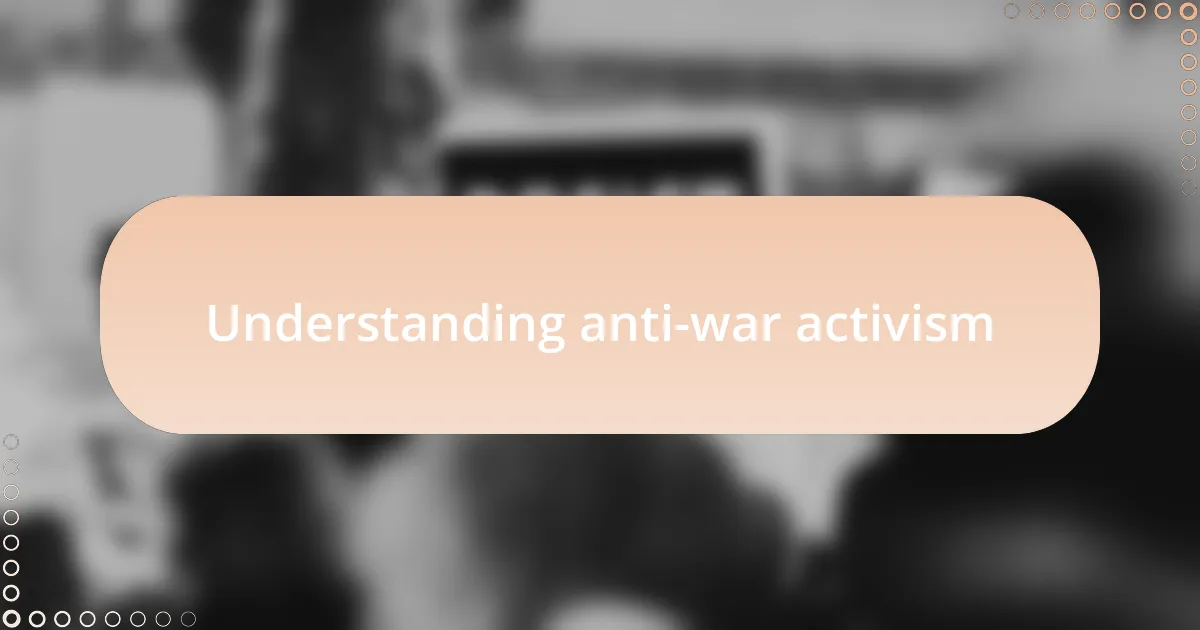
Understanding anti-war activism
Anti-war activism is rooted in the desire for peace, driven by the deeply held belief that all lives have intrinsic value. I remember standing in a peaceful protest, feeling the energy of hundreds united in a common cause. It made me wonder: what if this collective voice could echo loud enough to shift the tide toward understanding rather than conflict?
At its core, anti-war activism challenges the narrative that war is a necessary solution to international disputes. I once met a veteran at a discussion panel who shared his haunting memories; it struck me that each story has the power to transform hearts and minds. Isn’t it worth questioning the reasons behind our governments’ decisions to engage in war when so many innocents suffer?
Many activists focus on grassroots movements, believing that local actions can ripple outward to effect real change. I’ve personally participated in educational workshops aimed at informing communities about the costs of war, and it was enlightening to see eyes widen as truths were unveiled. How can we foster deeper understanding and empathy in our societies if we don’t engage in these crucial dialogues?
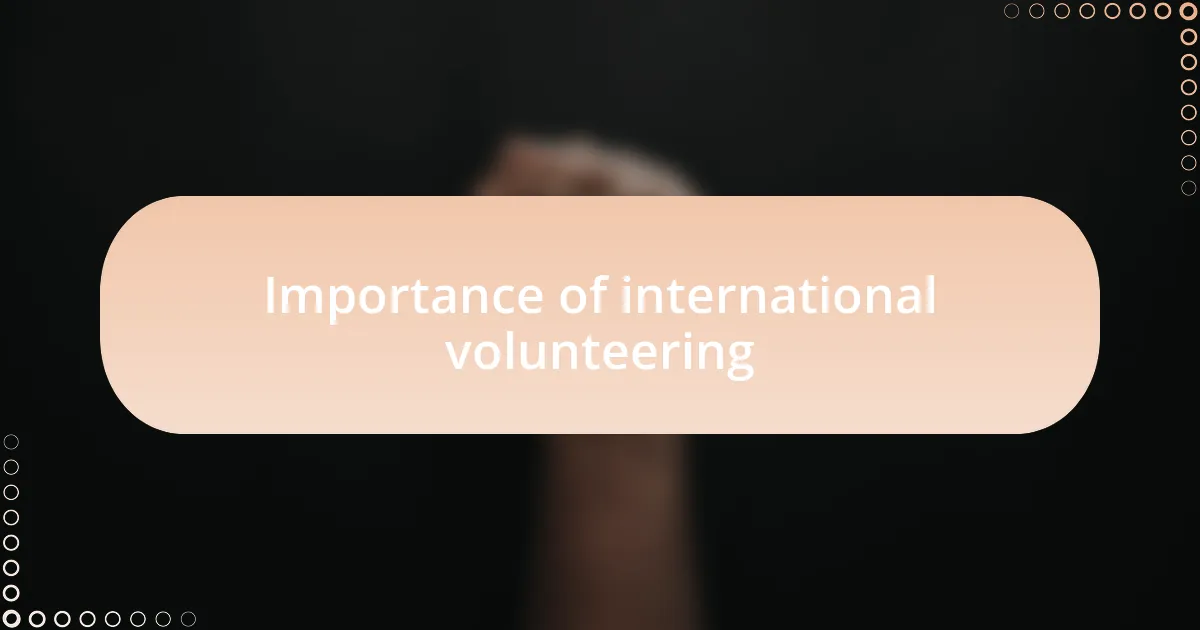
Importance of international volunteering
International volunteering plays a vital role in fostering global understanding and solidarity. During my time volunteering abroad, I encountered individuals with vastly different experiences, yet we all shared a common goal—making a positive impact. It was in those moments of connection that I realized how vital personal relationships are in promoting peace and dismantling barriers.
Moreover, engaging with diverse communities through international volunteering allows us to witness the real-life consequences of conflict. I vividly remember working alongside local artisans in a war-torn region, hearing their stories of resilience and hope. This firsthand experience deepened my understanding of the complexities of war and strengthened my resolve to advocate against it. How can one remain oblivious to the importance of peace after seeing the struggles faced by those affected?
Additionally, volunteering internationally often ignites a passion for social justice and inspires long-term commitment to anti-war efforts. After returning home from my service, I felt a strong urge to share what I learned with my community. This sparked initiatives that continue to promote peace and understanding locally. Isn’t it amazing how a single experience can light a fire within us, pushing us to engage others in the fight for a better, more peaceful world?
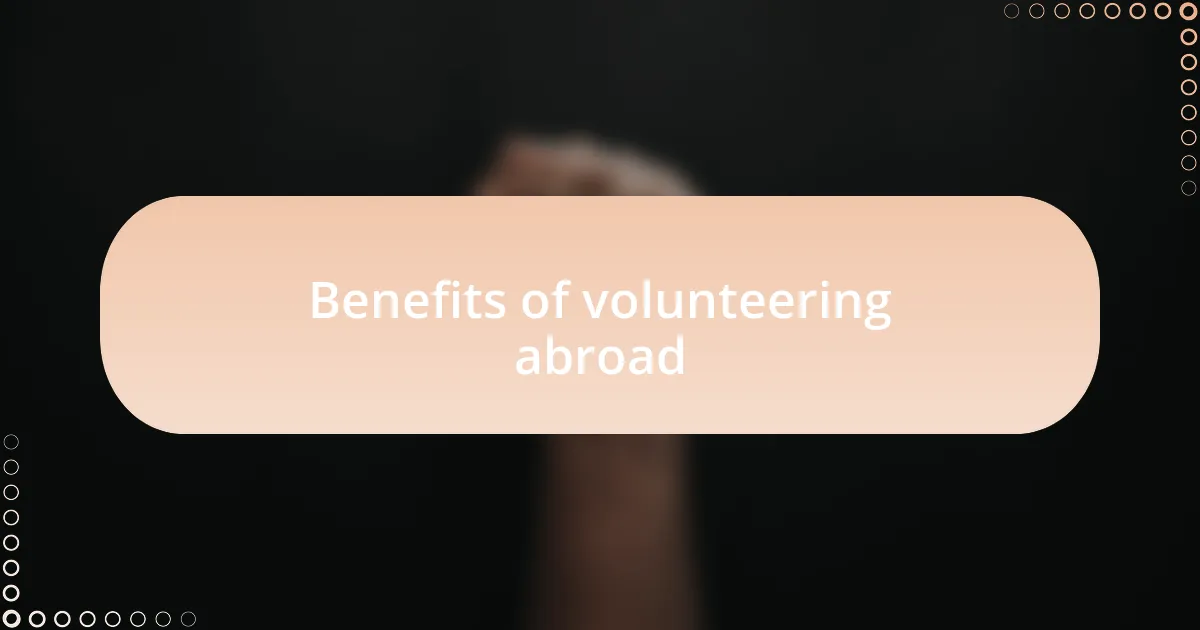
Benefits of volunteering abroad
Volunteering abroad opens doors to incredible personal growth. I still remember stepping into a community project in a different country, feeling a blend of excitement and nerves. That experience challenged my assumptions and pushed me outside my comfort zone, ultimately helping me develop new skills and perspectives. Have you ever had that moment where you realize you’re not just helping others but also growing immensely yourself?
Another significant benefit is the chance to build lasting relationships across cultures. During my time volunteering, I formed connections with fellow volunteers and locals that have transcended borders. Each friendship enriched my experience, teaching me invaluable lessons about empathy and resilience. How powerful is it to know you have friends around the world who share your vision for peace?
Furthermore, engaging with diverse communities can ignite a deeper understanding of global issues, particularly the impact of conflict. I recall a moment spent with a young boy in a refugee camp, his laughter juxtaposed against the chaos surrounding us. His spirit highlighted the strength found in adversity, reminding me that even in the darkest times, hope persists. This insight opened my eyes to the broader implications of war, fueling my passion for advocacy. Wouldn’t we all benefit from seeing the world through such profound lenses?
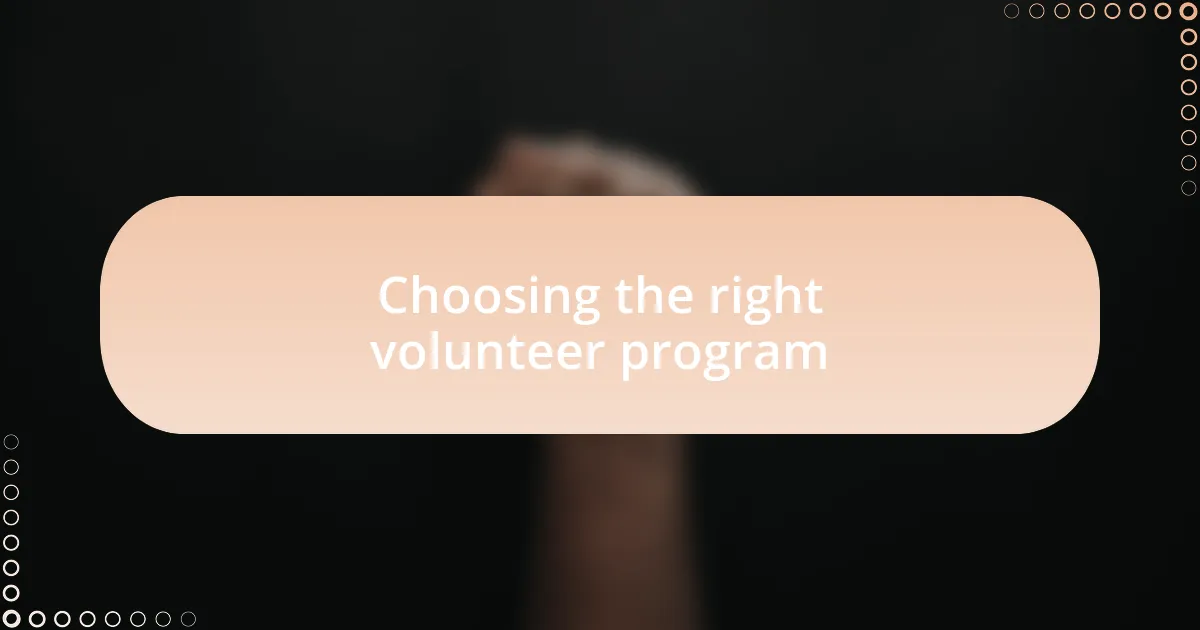
Choosing the right volunteer program
Choosing the right volunteer program can often feel overwhelming, but it’s essential to align your values with the mission of the organization. When I was searching for programs, I made a list of what mattered most to me, such as anti-war initiatives and community empowerment. This clarity not only guided my choices but also ensured that my efforts resonated deeply with the causes I am passionate about.
As I explored various opportunities, I learned the importance of researching a program’s impact and sustainability. I remember coming across a project that claimed to aid war-affected children, but when I delved deeper, I discovered it lacked a genuine connection with the community. Has there ever been a time when you found promises that fell short? That experience taught me that awareness of how programs operate is just as vital as their stated objectives.
I also found that speaking with former volunteers provided invaluable insights. During my journey, I chatted with someone who had previously volunteered in a similar role, and their stories helped me gauge the authenticity of the organization. Their experiences revealed the nuances of working on the ground, highlighting challenges I hadn’t considered. Isn’t it fascinating how firsthand accounts can shape your understanding and expectations?
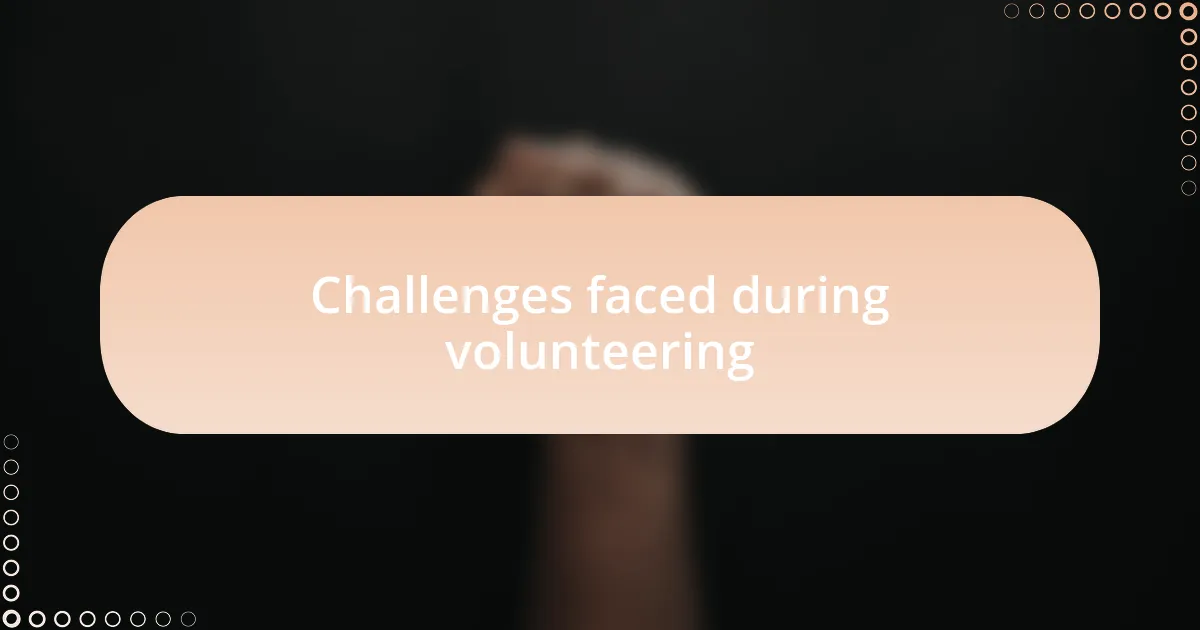
Challenges faced during volunteering
Volunteering internationally can be an enriching experience, yet it’s not without its challenges. One significant hurdle I faced was cultural adjustment. When I first arrived in a new country, I realized that my understanding of social norms was limited. I remember feeling isolated at times because my experiences clashed with local customs. Have you ever felt out of place in a new environment? It took me weeks to adapt, but each misstep offered valuable lessons about empathy and patience.
Another challenge I encountered was navigating the differing communication styles and expectations. During a community meeting, I discovered that what I considered direct input was seen as confrontational by local participants. That moment was a learning curve for me: I had to adjust my approach to foster trust and collaboration. Have you ever had to change your perspective to connect with others? I learned that sometimes, listening is just as important as sharing one’s insights.
Logistical issues also posed obstacles, from transportation difficulties to the unpredictable nature of time management in different cultures. I vividly recall a day where transportation was delayed, and I missed an important event that I had prepared for weeks. It was frustrating, but I soon realized that flexibility is key in volunteering. How do you deal with unexpected setbacks? Adapting my mindset transformed challenges into opportunities for growth in resilience and creativity.
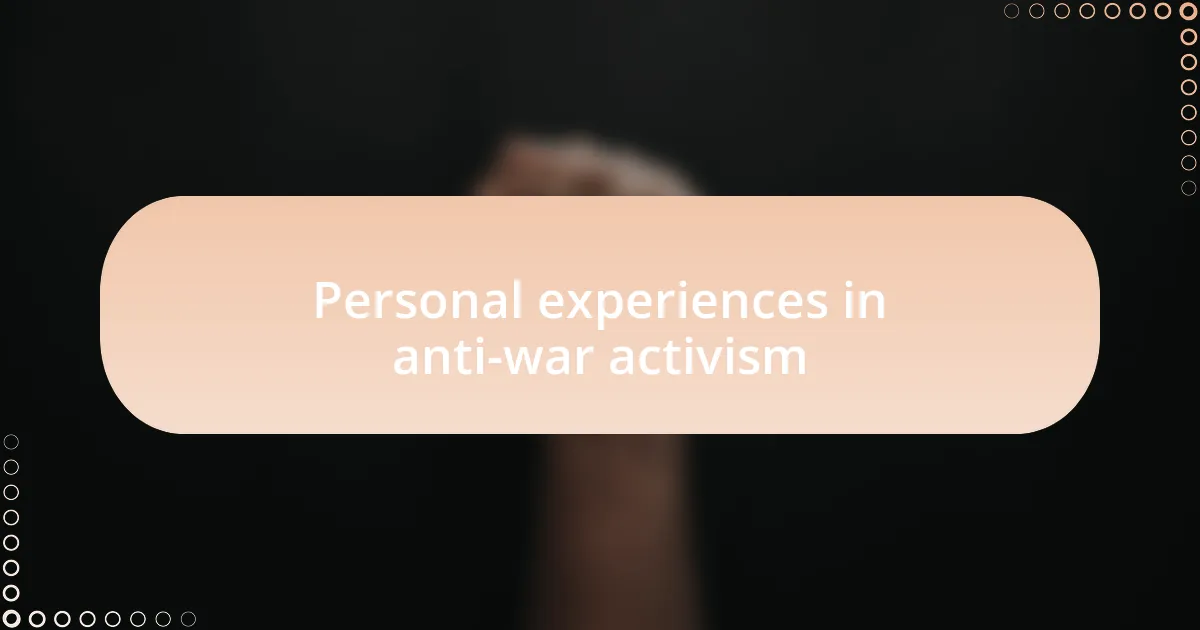
Personal experiences in anti-war activism
Engaging in anti-war activism has reshaped my perspective on conflict and community. I distinctly recall a protest where we gathered in solidarity, chanting for peace in the streets. The palpable energy reminded me of why I joined this movement in the first place: to amplify voices often silenced by war. Can you remember a moment where your conviction felt overwhelmingly powerful? For me, it was standing shoulder to shoulder with people from diverse backgrounds, all united by a shared hope for a better future.
During that same protest, I encountered a young woman who shared her own harrowing story of displacement due to conflict. Listening to her, I felt a deep sense of empathy, realizing that activism is not just about policies but the real human stories behind them. Have you ever listened to someone’s experience and transformed your anger into action? That day, her courage ignited a fire in me to engage more deeply in advocacy, and it was a vivid reminder that personal stories fuel the anti-war movement.
I also participated in community dialogues aimed at fostering peace and understanding among different cultural groups. One session struck me profoundly; it worked through our grief and anger collectively. We tackled tough questions about forgiveness and reconciliation. Reflecting on that experience, I found that every conversation offered a step towards healing, not just for ourselves, but for our communities. Isn’t it remarkable how dialogue can build bridges where walls once stood?

Lessons learned from my journey
One lesson I learned is the profound impact of patience in the world of activism. I remember a meeting with local leaders where we discussed strategic approaches to advocacy. Initially frustrated by the slow pace, I soon realized that meaningful change often takes time. Have you found yourself rushing for results? I learned to embrace the process, understanding that every small step is crucial in the grand scheme of peacebuilding.
Over time, I also recognized the significance of listening actively. During one volunteer trip, I sat with survivors of conflict who shared their hopes and dreams, and I realized that truly hearing their stories was just as vital as voicing my own. Did you know that sometimes silence can be the loudest form of support? This experience taught me that by creating space for others, I could foster genuine connections and build a stronger, unified front against war.
Lastly, I discovered the power of resilience in the face of adversity. After attending a rally that faced significant pushback from opposing groups, I found myself questioning the effectiveness of our efforts. However, hearing from fellow activists who persevered in their resolve reminded me that setbacks are part of the journey. Have you ever felt like giving up only to find strength in your community? This realization reinforced my conviction that resilience is a vital ingredient in our quest for peace.